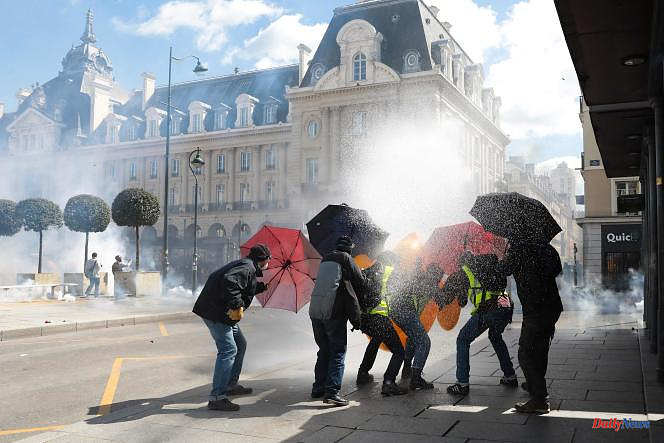Emmanuel Macron will address the French on Monday April 16, after the flash promulgation of the pension reform which outraged unions and oppositions on Saturday and showed the president's desire to quickly relaunch his second five-year term, hampered by the social and political crisis.
The "Law of April 14, 2023 on the amending financing of Social Security for 2023", signed Friday evening by the Head of State after the validation of the essentials of the reform by the Constitutional Council, was published in the Official Journal very early Saturday.
The Élysée announced in the process that the Head of State would address the French during a speech on Monday evening, a priori at 8 p.m. Emmanuel Macron will speak "in a logic of appeasement", to "take stock" of the three months of crisis and "also look at what has advanced alongside pensions", promised on TF1 government spokesman Olivier Véran, citing the drop in unemployment and taxes.
"In the weeks and months to come, around the President of the Republic, we are ready to accelerate" the reforms, said the Prime Minister on Saturday. "We want to build a France of full employment", "guarantee equal opportunities", "act" for health and even education, hammered Elisabeth Borne during a National Council of the Renaissance presidential party in Paris.
According to the head of government, who consulted the leaders of the various parties this week, "if the time is not for coalitions, majorities are possible, project by project, to offer solutions to the French".
Olivier Véran, for his part, confirmed that the gradual transition to the retirement age from 62 to 64 would start as early as September, at the rate of one quarter per year. The reassessment of certain small retirement pensions will be launched at the same time.
"The President of Chaos"
On the side of the unions, we do not admit defeat for all that. The inter-union has expressed its "determination" to continue the fight against the decline of the legal age to 64 years. Refusing to enter the post-crisis "agenda" of the executive, all declined an invitation to the Élysée on Tuesday.
The ultra-rapid publication of the reform, while the inter-union, united for three months of protest, "had solemnly asked the president not to promulgate the law", is "totally shameful", denounced the general secretary of the CGT, Sophie Binet. Emmanuel Macron "is becoming the president of chaos" and "opens a boulevard to the National Rally", she lashed out. "The contempt returned to the workers will have been constant", reacted his CFDT counterpart, Laurent Berger.
In opposition, Marine Le Pen pinned an "umpteenth provocation against the French", while the leader of La France insoumise (LFI), Jean-Luc Mélenchon, denounced an "absurd display of arrogance". The number one of the Socialist Party, Olivier Faure, sees him in this rapid promulgation a sign of "febrility". He promised "democratic harassment" to reverse the 64-year-old. Socialist deputies and senators have planned to table a legislative text asking for the repeal of the reform.
LFI deputy Eric Coquerel announced to Agence France-Presse (AFP) that his group had started discussions with the independents of the Liot group and the whole of Nupes with a view to a potential filing of a motion of censure.
Eleven arrests in Rennes
Barely had the reform been promulgated, violence again punctuated a demonstration in Rennes on Saturday where businesses were vandalized, two cars burned in addition to clashes with the police.
More than a thousand people, mostly young people, had gathered calmly at the beginning of the afternoon on Place de la République, at the call in particular of Rennes collectives on social networks. An "unauthorized" demonstration, according to the prefecture.
But less than half an hour after the departure of the procession, the situation began to degenerate, noted AFP journalists. Targeted by stones, bottles and sometimes fireworks launched by young people dressed in black, the police responded with numerous tear gas shots and the intervention of water cannons. The prefecture reported eleven arrested individuals who "will be presented to the judicial authority", as well as one slightly injured among the mobile gendarmes, and two among the demonstrators.
In Paris, 300 people marched in a calm atmosphere in the 19th arrondissement, with cries in particular of "Paris stand up, rise up", while in Lille, demonstrators, gathered on the Grand'Place for 6 p.m., started a procession which is currently crossing Old Lille, reports La Voix du Nord.
Actions across all sectors Thursday, April 20
The inter-union is banking on the traditional May 1 meeting which it wishes to transform into an "exceptional and popular mobilization day" against the heart of the reform, retirement at 64. The boss of the CFDT wishes "that on May 1, 'we break the house' in number of demonstrators in the street". "On the decrees, the concrete implementation of the measures, we are not going to let go of the government," he told Le Parisien.
In the meantime, the four SNCF unions announced "a day of expression of railway anger" on Thursday. And the CGT mentioned actions in all sectors on Thursday as well, as well as on April 28. The 12th day of mobilization last Thursday had delivered the second lowest mobilization score since the start of the movement (380,000 demonstrators according to the Ministry of the Interior, 1.5 million according to the CGT).
Reconnecting with the unions will not be easy. "There will be resentment, scars," slips a close friend of the head of state. And with what majority? Elisabeth Borne shared the conclusions of her consultations with Emmanuel Macron this week. A status quo is emerging: "If the time is not for coalitions, majorities are possible, project by project, to offer solutions to the French," said the head of government on Saturday.












